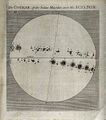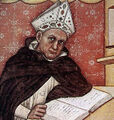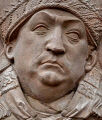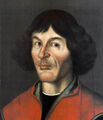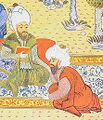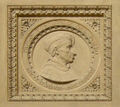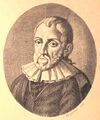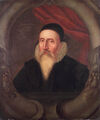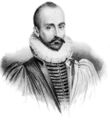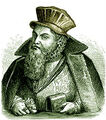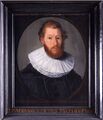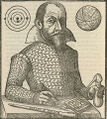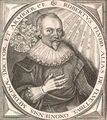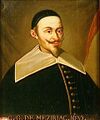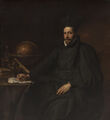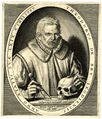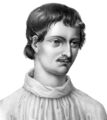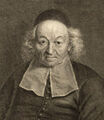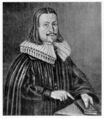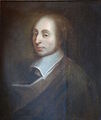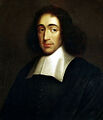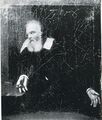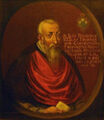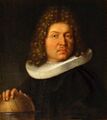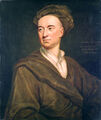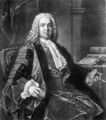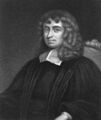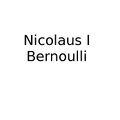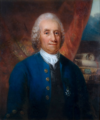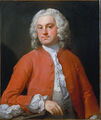Timeline: Early (nonfiction)
Timeline of non-fictional "On This Day in History" items ordered by date from earliest up to 1699 AD.
The Timeline comprises non-fictional "On This Day in History" items.
See also Middle Timeline and Modern Timeline
413 BC Aug. 28: A lunar eclipse caused panic among the sailors of the Athens fleet and thus affected the outcome of a crucial battle in the Peloponnesian War. The Athenians were ready to withdraw their forces from Syracuse when the Moon was eclipsed, but the eclipse caused the superstitious Athenian general Nicias to delay their departure. This delay gave an advantage to their enemies, the Syracusans, who then defeated the entire Athenian fleet and army, and killed Nicias.
322 BC Oct. 12: Athenian politician and orator Demosthenes takes his own life, to avoid being arrested by the agents of his enemies.
100 BC Jul. 13: Roman general and statesman Julius Caesar born. He will play a critical role in the events that led to the demise of the Roman Republic and the rise of the Roman Empire.
44 BC: Julius Caesar, Dictator of the Roman Republic, is stabbed to death by Marcus Junius Brutus, Gaius Cassius Longinus, Decimus Junius Brutus, and several other Roman senators on the Ides of March.
28 BC May 10: A sunspot is observed by Han dynasty astronomers during the reign of Emperor Cheng of Han, one of the earliest dated sunspot observations in China.
900s
940 Jun. 10: Mathematician and astronomer Abū al-Wafā' Būzjānī born. His Almagest will be widely read by medieval Arabic astronomers in the centuries after his death.
998 Jul 15: Mathematician and astronomer Abū al-Wafā' Būzjānī dies. His Almagest was widely read by medieval Arabic astronomers in the centuries after his death.
1000s
1013 Jul 18: Composer, mathematician, and astronomer Hermann of Reichenau born. He will write a treatise on the science of music, several works on geometry and arithmetic, and astronomical treatises (including instructions for the construction of an astrolabe, then a very novel device in Western Europe).
1054 Sep. 24: Composer, mathematician, and astronomer Hermann of Reichenau dies. He wrote a treatise on the science of music, several works on geometry and arithmetics and astronomical treatises (including instructions for the construction of an astrolabe, at the time a very novel device in Western Europe).
1100s
1126 Apr. 14: Polymath Ibn Rushd (Averoess) born. He will write on logic, Aristotelian and Islamic philosophy, theology, the Maliki school of Islamic jurisprudence, psychology, political and Andalusian classical music theory, geography, mathematics, and the mediæval sciences of medicine, astronomy, physics, and celestial mechanics.
1178 Jun. 18: Five Canterbury monks see what is possibly the Giordano Bruno crater being formed. It is believed that the current oscillations of the Moon's distance from the Earth (on the order of meters) are a result of this collision.
1198 Dec. 10: Polymath Ibn Rushd (Averoess) dies. He wrote on logic, Aristotelian and Islamic philosophy, theology, the Maliki school of Islamic jurisprudence, psychology, political and Andalusian classical music theory, geography, mathematics, and the mediæval sciences of medicine, astronomy, physics, and celestial mechanics.
1200's
1201 Feb. 18: Polymath Nasir al-Din al-Tusi born. Tusi will be a mathematician, architect, philosopher, physician, scientist, and theologian; he will establish trigonometry as a mathematical discipline in its own right.
1274 Jun. 26: Polymath Nasir al-Din al-Tusi dies. Tusi was a mathematician, architect, philosopher, physician, scientist, and theologian; he established trigonometry as a mathematical discipline in its own right.
1280 Nov. 15: Bishop, theologian, and philosopher Albertus Magnus dies. He was known during his lifetime as doctor universalis and doctor expertus and, late in his life, the term magnus was appended to his name.
1300's
1348 Jun. 18: Physician and academic Gentile Gentili da Foligno dies. Da Foligno was among the first European physicians to perform a dissection on a human being (1341).
1390 Jun. 23: Priest, philosopher, physicist, and theologian John Cantius born. He will help develop Jean Buridan's theory of impetus, anticipating the work of Galileo and Newton.
1400s
1402 Apr. 28: Aztec philosopher, warrior, architect, poet, and ruler Nezahualcoyotl born. He will have an experience of an "Unknown, Unknowable Lord of Everywhere" to whom he will build an entirely empty temple in which no blood sacrifices of any kind will be allowed.
1423 May 30: Mathematician and astronomer Georg von Peuerbach born. He will be remembered for his streamlined presentation of Ptolemaic astronomy in the Theoricae Novae Planetarum.
1423 Jul. 6: Mathematician and architect Antonio Manetti born. He will investigate the site, shape and size of Dante's Inferno, and write a biography of the architect Filippo Brunelleschi.
1433 Oct. 19: Priest, humanist philosopher, and astrologer Marsilio Ficino born. His Florentine Academy, an attempt to revive Plato's Academy, will influence the direction and tenor of the Italian Renaissance and the development of European philosophy.
1436 June 6: Mathematician, astronomer, and bishop Johann Regiomontanus born. His contributions will be instrumental in the development of Copernican heliocentrism in the decades following his death.
1452: Polymath Leonardo da Vinci born. His areas of interest will include painting, sculpting, architecture, invention, science, music, mathematics, engineering, literature, anatomy, geology, astronomy, botany, writing, history, and cartography.
1452 Dec. 10: Mathematician, astronomer, astrologer, priest, maker of astronomical instruments, and professor Johannes Stöffler born.
1453 Mar. 2: Doctor, astronomer, and astrologer Johannes Engel born. He will publish numerous almanacs, planetary tables, and calendars.
1461 Apr. 8: Mathematician and astronomer Georg von Peuerbach dies. He is remembered for his streamlined presentation of Ptolemaic astronomy in the Theoricae Novae Planetarum.
1462 Feb. 1: Polymath Johannes Trithemius born. He will be remembered as a lexicographer, chronicler, cryptographer, and occultist.
1470 Sep. 11: Mapmaker Martin Waldseemüller born. He will produce a globular world map and a large 12-panel world wall map using the information from Columbus and Vespucci's travels (Universalis Cosmographia), both bearing the first use of the name "America".
1471 May 21: Painter, engraver, and mathematician Albrecht Dürer born. Dürer will be regarded as the greatest German Renaissance artist: his vast body of work will include altarpieces and religious works, numerous portraits and self-portraits, and copper engravings.
1472 Jun. 4: Aztec philosopher, warrior, architect, poet, and ruler Nezahualcoyotl dies. He had an experience of an "Unknown, Unknowable Lord of Everywhere" to whom he built an entirely empty temple in which no blood sacrifices of any kind were allowed.
1473 Feb. 19: Mathematician and astronomer Nicolaus Copernicus born. He will formulate a model of the universe that places the Sun rather than the Earth at the center of the universe.
1473 Dec. 24: Priest, philosopher, physicist, and theologian John Cantius dies. He helped develop Jean Buridan's theory of impetus, anticipating the work of Galileo and Newton.
1474 Dec. 16: Astronomer, mathematician, and physicist Ali Qushji dies. Qushji contributed to the development of astronomical physics independent from natural philosophy, and provided empirical evidence for the Earth's rotation.
1476 Jul. 6: Mathematician, astronomer, and bishop Johann Regiomontanus dies. Regiomontanu made contributions to astronomy which will be instrumental in the development of Copernican heliocentrism in the follwing decades.
1477 Jan. 16: Johannes Schöner born. He will enjoy a European wide reputation as an innovative and influential globe maker and cosmographer and as one of the continent's leading and most authoritative astrologers.
1482 May 10: Mathematician and astronomer Paolo dal Pozzo Toscanelli dies. Thanks to his long life, his intelligence and his wide interests, Toscanelli was one of the central figures in the intellectual and cultural history of Renaissance Florence in its early years.
1497 May 26: Mathematician and architect Antonio Manetti dies. He investigated the site, shape and size of Dante's Inferno, and wrote a biography of the architect Filippo Brunelleschi.
1499 Oct. 1: Priest, humanist philosopher, and astrologer Marsilio Ficino dies. His Florentine Academy, an attempt to revive Plato's Academy, influenced the direction and tenor of the Italian Renaissance and the development of European philosophy.
1500s
1501 Sep. 24: Gerolamo Cardano born. Cardano will be one of the most influential mathematicians of the Renaissance.
1502 Jan. 11: Mathematician, cosmographer, and academic Pedro Nunes born. Nunes will be one of the greatest mathematicians of his time, known for his mathematical approach to navigation and cartography.
1502 Jul. 26: Christian Egenolff born. Egenolff will be the first important printer and publisher operating from Frankfurt-am-Main.
1508 Jun. 13: Humanist and philosopher Alessandro Piccolomini born. Piccolomini will promote vernacular translations of Latin and Greek scientific and philosophical treatises.
1508 Dec. 9: Physician, mathematician, and cartographer Gemma Frisius born. Frisius will create important globes, improve the mathematical instruments of his day, and apply mathematics to surveying and navigation in new ways.
1509 Nov. 7: Philosopher and scientist Bernardino Telesio born. Telesio's emphasis on observation will influence the emergence of the scientific method.
1512 Sep. 29: Doctor, astronomer, and astrologer Johannes Engel dies. Engel published numerous almanacs, planetary tables, and calendars.
1516 Dec. 13: Polymath Johannes Trithemius dies. Trimethius is remembered as a lexicographer, chronicler, cryptographer, and occultist.
1518 Jul 3: Physician and scientist Li Shizhen born. Li Shizhen will develop many innovative methods for the proper classification of herb components and medications to be used for treating diseases, earning a reputation as the greatest scientific naturalist of China.
1519 May 2: Polymath Leonardo da Vinci dies. Da Vinci's areas of interest included painting, sculpting, architecture, invention, science, music, mathematics, engineering, literature, anatomy, geology, astronomy, botany, writing, history, and cartography.
1520 Mar. 16: Mapmaker Martin Waldseemüller dies. Waldseemüller produced a globular world map and a large 12-panel world wall map using the information from Columbus and Vespucci's travels (Universalis Cosmographia), both bearing the first use of the name "America".
1523 Apr. 5: Cryptographer and diplomat Blaise de Vigenère (nonfiction) born. The "Vigenère cipher" will be misattributed to him; Vigenère himself will devise a different, stronger cipher.
1527 Apr. 14: Cartographer and geographer Abraham Ortelius born. Ortelius will create the first modern atlas, the Theatrum Orbis Terrarum. He will also be one of the first to imagine that the continents were joined together before drifting to their present positions.
1527 Jul. 13: Mathematician, astronomer, and astrologer John Dee born. Dee will achieve high status as a scholar and play a role in Elizabethan politics.
1528 Apr. 6: Painter, engraver, and mathematician Albrecht Dürer dies. Dürer is regarded as the greatest German Renaissance artist: his vast body of work will include altarpieces and religious works, numerous portraits and self-portraits, and copper engravings.
1541 Apr. 8: Physician and archaeologist Michele Mercati born. Mercati will be one of the first scholars to recognize prehistoric stone tools as human-made rather than natural or mythologically created thunderstones.
1533 Feb. 28: Philosopher and author Michel de Montaigne born. De Montaigne will be one of the most significant philosophers of the French Renaissance, known for popularizing the essay as a literary genre.
1539 Feb. 27: Scholar, printer, and bookseller Franciscus Raphelengius born. Raphelengius will produce an Arabic-Latin dictionary, about 550 pages, which will be published posthumously in 1613 at Leiden — the first publication by printing press of a book-length dictionary for the Arabic language in Latin.
1543 May 24: Mathematician and astronomer Nicolaus Copernicus dies. Copernicus formulated a model of the universe that places the Sun rather than the Earth at the center of the universe.
1547 Jan. 16: Johannes Schöner dies. Schöner enjoyed a European wide reputation as an innovative and influential globe maker and cosmographer and as one of the continent's leading and most authoritative astrologers.
1547 Sep. 22: Philologist, mathematician, astronomer, and poet Philipp Nicodemus Frischlin born. Frischlin's prolific and versatile genius will produce a great variety of works, but his reckless life and libelous letters will lead to imprisonment.
1550 Sep. 30: Astronomer and mathematician Michael Maestlin born. Maestlin will be a mentor to Johannes Kepler, and play a sizable part in his adoption of the Copernican system.
1550 Dec. 22: Philosopher and academic Cesare Cremonini born. Cremonini work will promote rationalism (against revelation) and Aristotelian materialism (against the dualist immortality of the soul) inside scholasticism.
1551 Jan. 17: Writer, humanist, and historian Pedro Mexía dies. Mexía wrote Silva de varia lección ("A Miscellany of Several Lessons"), which became an early best seller across Europe.
1552 Apr. 15: Mathematician and astronomer Pietro Cataldi born. Cataldi will contribute to the development of continued fractions and a method for their representation; he will also discover the sixth and seventh perfect numbers by 1588.
1552 Aug. 14: Statesman, scientist, and historian Paolo Sarpi born. Saroni will be a proponent of the Copernican system, a friend and patron of Galileo Galilei, and a keen follower of the latest research on anatomy, astronomy, and ballistics at the University of Padua.
1555 Feb. 9: Christian Egenolff dies. Egenolff was the first important printer and publisher operating from Frankfurt-am-Main.
1555 May 25: Physician, mathematician, and cartographer Gemma Frisius dies. Frisius created important globes, improved the mathematical instruments of his day, and applied mathematics to surveying and navigation in new ways.
1555 Jun. 13: Mathematician, cartographer, and astronomer Giovanni Antonio Magini born. Magini will support a geocentric system of the world, in preference to Copernicus's heliocentric system.
1555 Aug. 8: Mathematician and cartographer Oronce Finé dies. Finé was imprisoned in 1524, probably for practicing judicial astrology.
1560 Aug. 21: The occurrence at the predicted time of a solar eclipse in Copenhagen turns Tycho Brahe towards a life of observational astronomy.
1561 Jan. 6: Mathematician and physicist Thomas Fincke born. Fincke will introduce the modern names of the trigonometric functions tangent and secant.
1561 Aug. 24: Mathematician, astronomer, and theologian Bartholomaeus Pitiscus born. Pitiscus will coin the word "trigonometry".
1565: Explorer Cornelis de Houtman born. Houtman will discover a new sea route from Europe to Indonesia, beginning the Dutch spice trade.
1570 May 20: Cartographer and geographer Abraham Ortelius issues Theatrum Orbis Terrarum, the first modern atlas. Pic.
1570 Oct. 6: Gerolamo Cardano imprisoned for 87 days on charges of impiety (casting a horoscope of Christ). Cardano spent the remaining five years of his life in Rome under the eye of a suspicious pope who nonetheless gave him a pension.
1571 Dec. 9: Mathematician and astronomer Adriaan Metius born. Metius will manufacture precision astronomical instruments, and published treatises on the astrolabe and on surveying.
1573 Jan. 20: Astronomer Simon Marius born. Marius will discover the four largest moons of Jupiter, independently of Galileo Galilei.
1574 Jan. 17: Astrologer, mathematician, cosmologist, Qabalist and Rosicrucian apologist Robert Fludd born.
1574 Mar. 5: Mathematician William Oughtred born. Oughtred will invent the slide rule in 1622.
1576 Sep. 21: Gerolamo Cardano dies. Cardano was one of the most influential mathematicians of the Renaissance.
1577 Jun. 12: Astronomer and mathematician Paul Guldin born. Guldin will discover the Guldinus theorem, which determines the surface and the volume of a solid of revolution.
1578 Aug. 11: Mathematician, cosmographer, and academic Pedro Nunes dies. Nunes was one of the greatest mathematicians of his time, best known for his mathematical approach to navigation and cartography.
1579 Mar. 12: Humanist and philosopher Alessandro Piccolomini dies. Piccolomini promoted vernacular translations of Latin and Greek scientific and philosophical treatises.
1580 May 5: Mathematician Johann Faulhaber born. He will discover Faulhaber's formula, which expresses the sum of the p-th powers of the first n positive integers.

1580 Jun. 13: Astronomer and mathematician Willebrord Snellius born. Snellius will conduct a large-scale experiment in 1615 to measure the circumference of the earth using triangulation, underestimating the circumference of the earth by 3.5%.
1581 Oct. 9: Mathematician and linguist Claude Gaspard Bachet de Méziriac born. De Méziriac will do work in number theory and find a method of constructing magic squares.
1583 Feb. 23: Mathematician, astrologer, and astronomer Jean-Baptiste Morin born. Morin will champion the geocentric worldview, opposing Galileo and his ideas; Morin will also oppose Descartes' ideas after meeting the philosopher in 1638.
1586 Dec 6: Astronomer and physicist Niccolò Zucchi born. Zucchi will publish works on astronomy, optics, mechanics, and magnetism.
1588 Sep. 8: Mathematician, theologian, and philosopher Marin Mersenne born. Mersenne will be remembered as the "father of acoustics".
1588 Oct. 2: Philosopher and scientist Bernardino Telesio dies. While Telesio's natural theories were later disproven, his emphasis on observation influenced the emergence of the scientific method.
1590 Nov. 29: Philologist, mathematician, astronomer, and poet Philipp Nicodemus Frischlin dies, killed by a fall in attempting to let himself down from the window of his cell. Frischlin's prolific and versatile genius produced a great variety of works, but his reckless life and libelous letters led to imprisonment.
1591 Feb. 21: Mathematician and engineer Girard Desargues born. Desargues will be one of the founders of projective geometry.
1591 June 16: Physician, mathematician, and theorist Joseph Solomon Delmedigo born. Delmedigo will write Elim (Palms), dealing astronomy, physics, mathematics, medicine, metaphysics, and music theory.
1592 Apr. 22: Minister, scholar, astronomer, mathematician, cartographer, and inventor Wilhelm Schickard born. Schickard will design and build calculating machines, and invent techniques for producing improved maps.
1592 Sep. 13: Philosopher and author Michel de Montaigne dies. De Montaigne was one of the most significant philosophers of the French Renaissance, known for popularizing the essay as a literary genre.
1593 Jun. 25: Physician and archaeologist Michele Mercati dies. Mercati was one of the first scholars to recognize prehistoric stone tools as human-made rather than natural or mythologically created thunderstones.
1596 Feb. 19: Cryptographer and diplomat Blaise de Vigenère (nonfiction) dies. The Vigenère cipher was misattributed to him; Vigenère himself devised a different, stronger cipher.
1597 Mar. 1: Priest and mathematician Jean-Charles della Faille born. Faille will publish a method for calculating the center of gravity of the sector of a circle.
1597 Jul 20: Scholar, printer, and bookseller Franciscus Raphelengius dies. Raphelengius produced an Arabic-Latin dictionary, about 550 pages, which was published posthumously in 1613 at Leiden — the first publication by printing press of a book-length dictionary for the Arabic language in Latin.
1597 Oct. 13: Astronomer Johannes Kepler replied to Galileo's letter of 4 August, 1597, urging him to be bold and proceed openly in his advocacy of Copernicanism.
1598: Engraver, goldsmith, and publisher Theodor de Bry dies. de Bry gained fame for his depictions of early European expeditions. Although de Bry never visited the Americas, most of his books are based on first-hand observations by explorers.
1598 Apr. 17: Priest and astromomer Giovanni Battista Riccioli born. Riccioli will experiment with pendulums and falling bodies, discuss arguments concerning the motion of the Earth, and introduce the current scheme of lunar nomenclature.
1598 Jun. 28: Cartographer and geographer Abraham Ortelius dies. Ortelius created the first modern atlas, the Theatrum Orbis Terrarum. He was also one of the first to imagine that the continents were joined together before drifting to their present positions.
1599 Sep. 1: Explorer Cornelis de Houtman dies. De Houtman discovered a new sea route from Europe to Indonesia, beginning the Dutch spice trade.
1600s
1600 Feb. 17: Dominican friar, philosopher, mathematician, poet, and cosmological theorist Giordano Bruno is burned at the stake.
1600 Feb. 19: The Peruvian stratovolcano Huaynaputina explodes in the most violent eruption in the recorded history of South America.
1602 Aug. 10: Mathematician and academic Gilles de Roberval born. De Roberval will publish a system of the universe in which he supports the Copernican heliocentric system and attributes a mutual attraction to all particles of matter.
1602 Nov. 30: Scientist, inventor, and politician Otto von Guericke born. Von Guericke will pioneer the physics of vacuums, and discover an experimental method for demonstrating electrostatic repulsion.
1604 May 10: Alchemist and chemist Johann Rudolf Glauber Glauber. He will be an early industrial chemical engineer.
1604 Oct. 17: Kepler's Supernova: German astronomer Johannes Kepler observes a supernova in the constellation Ophiuchus.
1605 Sep. 28: Mathematician and astronomer Ismaël Bullialdus born. Bullialdus will be an active member of the Republic of Letters, and an early defender of the ideas of Copernicus, Kepler and Galileo.
1606 Mar. 30: Mathematician and astronomer Vincentio Reinieri born. Reinieri will revise and finish the work of Galileo, who before his death will place all of the papers containing his observations and calculations in Reinieri's hands.
1607 Oct. 5: Assassins sent by Pope Paul V attempt to kill Venetian statesman and scientist Paolo Sarpi, who survives fifteen stiletto thrusts.
1608 Jan. 28: Physiologist, physicist, and mathematician Giovanni Alfonso Borelli born. He will contribute to the modern principle of scientific investigation by continuing Galileo's practice of testing hypotheses against observation.
1608 Oct. 15: Physicist and mathematician Evangelista Torricelli born. He will invent the barometer, make advances in optics, and work on the method of indivisibles.
1610 Mar 19: Painter Hasegawa Tōhaku dies. He founded the Hasegawa school and one of the great painters of the Azuchi–Momoyama period (1573-1603). He is best known for his byōbu folding screens, such as Pine Trees and Pine Tree and Flowering Plants.
1610 May 11: Priest and mathematician Matteo Ricci dies. Ricci translated Euclid's Elements into Chinese as well as the Confucian classics into Latin for the first time.
1613 Jul. 2: Mathematician, astronomer, and theologian Bartholomaeus Pitiscus dies. Pitiscus coined the word "trigonometry".
1615 Feb. 4: Polymath Giambattista della Porta dies. Della Porta's most famous work, Magiae Naturalis (1558), covers a variety of the subjects he had investigated, including occult philosophy, astrology, alchemy, mathematics, meteorology, and natural philosophy.
1616 Mar. 5: Nicolaus Copernicus's book On the Revolutions of the Heavenly Spheres is added to the Index of Forbidden Books 73 years after it was first published.
1616 Jul. 25: Physician, alchemist and chemist Andreas Libavius dies. Libavius accepted the Paracelsian principle of using occult properties to explain phenomena with no apparent cause, but rejected the conclusion that a thing possessing these properties must have an astral connection to the divine.
1616 Dec. 3: Mathematician and cryptographer John Wallis born. Wallis will serve as chief cryptographer for Parliament and, later, the royal court.
1617 Feb. 11: Mathematician, cartographer, and astronomer Giovanni Antonio Magini dies. Magini supported a geocentric system of the world, in preference to Copernicus's heliocentric system.
1618 Mar. 8: Mathematician and astronomer Johannes Kepler discovers the third law of planetary motion.
1618 May 15: Johannes Kepler confirms his previously rejected discovery of the third law of planetary motion (he first discovered it on March 8 but soon rejected the idea after some initial calculations were made).
1622 Apr. 5: Mathematician and scientist Vincenzo Viviani born. In 1660, Viviani and Giovanni Alfonso Borelli will conduct an experiment to determine the speed of sound. Timing the difference between the seeing the flash and hearing the sound of a cannon shot at a distance, they will calculate a value of 350 meters per second (m/s), considerably better than the previous value of 478 m/s obtained by Pierre Gassendi.
1623 Jan. 15: Statesman, scientist, and historian Paolo Sarpi dies. Sarpi was a proponent of the Copernican system, a friend and patron of Galileo Galilei, and a keen follower of the latest research on anatomy, astronomy, and ballistics at the University of Padua.
1623 Jun. 19: Mathematician, physicist, inventor, writer, and Christian philosopher Blaise Pascal born. Pascal will do pioneering work on calculating machines.
1625 Jan. 5: Astronomer Simon Marius dies. He discovered the four largest moons of Jupiter, independently of Galileo Galilei.
1625 Jun. 8: Mathematician, astronomer, and engineer Giovanni Domenico Cassini born. Cassini will discover four satellites of the planet Saturn and note the division of the rings of Saturn; the Cassini Division will be named after him.
1625 Sep. 24: Mathematician and politician Johan de Witt born. De Witt will derive the basic properties of quadratic forms, an important step in the field of linear algebra.
1626 Feb. 11: Mathematician and astronomer Pietro Cataldi dies. Cataldi contributed to the development of continued fractions and a method for their representation; he also discovered the sixth and seventh perfect numbers by 1588.

1626 Oct. 30: Astronomer and mathematician Willebrord Snellius dies. In 1615 he conducted a large-scale experiment to measure the circumference of the earth using triangulation, underestimating the circumference of the earth by 3.5%.
1628 Mar. 10: Physician and biologist Marcello Malpighi born. Malpighi will make pioneering contributions to anatomy, histology, physiology, embryology, and microscopy.
1629 Apr. 14: Mathematician, astronomer, and physicist Christiaan Huygens born. He will be a leading scientist of his time.
1631 Jul. 19: Philosopher and academic Cesare Cremonini dies. His work promoted rationalism (against revelation) and Aristotelian materialism (against the dualist immortality of the soul) inside scholasticism.
1631 Oct. 20: Astronomer and mathematician Michael Maestlin dies. He was a mentor to Johannes Kepler, and played a sizable part in his adoption of the Copernican system.
1632 Nov. 24: Philosopher, scholar, and lens-grinder Baruch Spinoza born. He will lay the groundwork for the 18th-century Enlightenment and modern biblical criticism, including modern conceptions of the self and the universe.
1633 Jun. 1: Astronomer and academic Geminiano Montanari born. He will make the observation that Algol in the constellation of Perseus varies in brightness.
1633 Jun. 22: The Holy Office in Rome forces Galileo Galilei to recant his view that the Sun, not the Earth, is the center of the Universe in the form he presented it in, after heated controversy.
1634 Aug. 18: Urbain Grandier, accused and convicted of sorcery, is burned alive in Loudun, France. He was the victim of a politically motivated persecution led by the powerful Cardinal Richelieu.
1635 Sep. 6: Mathematician and astronomer Adriaan Metius dies. He manufactured precision astronomical instruments, and published treatises on the astrolabe and on surveying.
1635 Oct. 24: Minister, scholar, astronomer, mathematician, cartographer, and inventor Wilhelm Schickard dies. He design and built calculating machines, and invented techniques for producing improved maps.
1638 Feb. 26: Mathematician and linguist Claude Gaspard Bachet de Méziriac dies. He was the earliest writer who discussed the solution of indeterminate equations by means of continued fractions. He also did work in number theory and found a method of constructing magic squares.
1638 Aug. 6: Priest and philosopher Nicolas Malebranche born. He will be instrumental in introducing and disseminating the contributions of René Descartes and Gottfried Wilhelm Leibniz in France.
1638 Aug. 23: Descartes' proposal. René Descartes, in a letter to Marin Mersenne, proposed his folium (x-cubed + y-cubed = 2axy) as a test case to challenge Pierre de Fermat's differentiation techniques. To Descartes' embarrassment, Fermat's method worked.
1640 Mar. 18: Painter, mathematician, astronomer, and architect Philippe de La Hire born.
1640 Jun. 16: Mathematician Jacques Ozanam born. Ozanam's Récréations mathématiques et physiques (1694) will later be translated into English and remain popular into the modern era.
1640 Oct. 18: Mathematician Pierre de Fermat announced his "little theorem" in a letter to Bernard Frenicle de Bessey.
1644 Jun. 11: Physicist and mathematician Evangelista Torricelli writes in a letter to Michelangelo Ricci: Noi viviamo sommersi nel fondo d'un pelago d'aria ("We live submerged at the bottom of an ocean of air").
1643 Nov. 3: Astronomer and mathematician Paul Guldin dies. Guldin discovered the Guldinus theorem, which determines the surface and the volume of a solid of revolution.
1644 Sep. 25: Astronomer and instrument maker Ole Rømer born. He will make the first quantitative measurements of the speed of light.
1646 Jul. 1: Mathematician and philosopher Gottfried Wilhelm Leibniz born. Leibniz will develop differential and integral calculus independently of Isaac Newton, and design and build mechanical calculators.
1646 Nov. 29: Theologian, astronomer, astrologer, and Archbishop of Uppsala Laurentius Paulinus Gothus dies.
1647 Jan. 17: Astronomer Elisabeth Hevelius born. One of the first female astronomers, Hevelius will be called "the mother of moon charts".
1647 Oct. 25: Physicist and mathematician Evangelista Torricelli dies. Torricelli invented the barometer, made advances in optics, and worked on the method of indivisibles.
1647 Nov 5: Mathematician and astronomer Vincentio Reinieri dies. Reinieri revised and finished the work of Galileo, who before his death placed all of the papers containing his observations and calculations in Reinieri's hands.
1648 Sep. 1: Mathematician, theologian, and philosopher Marin Mersenne dies. Mersenne is remembered as the "father of acoustics".
1648 Sep. 19: Blaise Pascal performs experiments to confirm the theory of atmospheric pressure and the existence of a vacuum.
1650 Aug. 16: Monk, cosmographer, and cartographer Vincenzo Coronelli born. Coronelli will gain fame for his atlases and globes; some of the globes will be very large and highly detailed.
1652 Jun. 21: Architect Inigo Jones dies. Jones was one of the first architects of the early modern period to employ Vitruvian rules of proportion and symmetry in his buildings.
1652 Nov. 4: Priest and mathematician Jean-Charles della Faille dies. He published a method for calculating the center of gravity of the sector of a circle.
1652: Mathematician, physician, and astronomer Jan Brożek dies. Brożek contributed to a greater knowledge of Nicolaus Copernicus' theories and was his ardent supporter and early prospective biographer.
1654 Oct. 27: Blaise Pascal writes to Pierre de Fermat, praising him for his solution to the Problem of the Points, about which they had exchanged seven previous letters.
1655 Jan. 6: Mathematician Jacob Bernoulli born. Bernoulli will discover the fundamental mathematical constant e, and make important contributions to the field of probability.
1655 Oct. 16: Physician, mathematician, and theorist Joseph Solomon Delmedigo dies. Delmedigo's Elim (Palms) deals with astronomy, physics, mathematics, medicine, metaphysics, and music theory.
1656 Jan. 23: Blaise Pascal publishes the first of his Lettres provinciales, in which he humorously attacks casuistry and accuses Jesuits of moral laxity, his tone combining the fervor of a convert with the wit and polish of a man of the world.
1656 Apr. 24: Mathematician and physicist Thomas Fincke dies. Fincke introduced the modern names of the trigonometric functions tangent and secant.
1656 Nov. 6: Mathematician, astrologer, and astronomer Jean-Baptiste Morin dies.
1565 Nov. 10: Theologian, astronomer, astrologer, and Archbishop of Uppsala Laurentius Paulinus Gothus born.
1659 Oct. 22: Chemist and physician Georg Ernst Stahl born. Stahl's works on phlogiston will be accepted as an explanation for chemical processes until the late 18th century.
1660 Jun. 30: Mathematician William Oughtred dies. Oughtred invented the slide rule in 1622.
1660 Aug. 21: Physician, mathematician, and engineer Hubert Gautier born. Gautier will author the first book on bridge building, Traité des Ponts, in 1716, as well as books on roads, fortifications, antiquities, geology, and a first manual for watercolor practitioners.
1662 Aug. 19: Mathematician, physicist, inventor, writer, and Christian philosopher Blaise Pascal dies. He did pioneering work on calculating machines.
1663 Dec. 28: Mathematician and physicist Francesco Maria Grimaldi dies. Working with Riccioli, he investigated the free fall of objects, confirming that the distance of fall was proportional to the square of the time taken.
1665 Mar. 6: The first joint Secretary of the Royal Society, Henry Oldenburg, publishes the first issue of Philosophical Transactions of the Royal Society.
1667 Apr. 29: Physician, satirist, and polymath John Arbuthnot born. He will invent the figure of John Bull.
1667 May 26: Mathematician and theorist Abraham de Moivre born. His book on probability theory, The Doctrine of Chances, will be prized by gamblers.
1667 Oct. 2: Mathematician and physicist Isaac Newton becomes a fellow at Trinity College, Cambridge. He had earned his bachelor's degree in 1665 and then spent two years at home in Lincolnshire inventing much of differential and integral calculus while Cambridge was closed due to plague.
1670 May 21: Astronomer and physicist Niccolò Zucchi dies. He published works on astronomy, optics, mechanics, and magnetism.
1671 Jun. 25: Priest and astromomer Giovanni Battista Riccioli dies. He experimented with pendulums and falling bodies, discussed arguments concerning the motion of the Earth, and introduced the current scheme of lunar nomenclature.
1672 Oct. 27: Mathematician and politician Johan de Witt dies in a riot. The rioters will partially eat his body.
1673 Aug. 11: Physician and astrologer Richard Mead born. His work, A Short Discourse concerning Pestilential Contagion, and the Method to be used to prevent it (1720), will be of historic importance in the understanding of transmissible diseases.
1675 Aug. 10: Mathematician and academic Gilles de Roberval dies. He published a system of the universe in which he supports the Copernican heliocentric system and attributes a mutual attraction to all particles of matter.
1675 Oct. 29: Gottfried Wilhelm Leibniz makes the first use of the long s (∫) as a symbol of the integral in calculus.
1676 Oct. 24: Isaac Newton summarized the state of development of his method of fluxions and power series in the "Epistola posterior," which he sent to Oldenburg to transmit to Leibniz.
1676 Nov. 21: Astronomer Ole Rømer presents the first quantitative measurements of the speed of light.
1677 Feb. 21: Philosopher, scholar, and lens-grinder Baruch Spinoza dies. He laid the groundwork for the 18th-century Enlightenment and modern biblical criticism, including modern conceptions of the self and the universe.
1677 May 4: Mathematician and theologian Isaac Barrow dies. He played an early role in the development of infinitesimal calculus.
1677 Sep. 5: Theologian, natural philosopher, and diplomat Henry Oldenburg dies. He was one of the foremost intelligencers of Europe of the seventeenth century, and the creator of scientific peer review.
1677 Sep. 27: Mathematician, astronomer, and cartographer Johann Gabriel Doppelmayr born. He will publish works on mathematics and astronomy, including sundials, spherical trigonometry, and celestial maps and globes, along with biographical information on several hundred mathematicians and instrument makers.
1678 Oct. 27: Mathematician Pierre Raymond de Montmort born. He will write Essay d'analyse sur les jeux de hazard, an influential book about probability and games of chance which will introduce the combinatorial study of derangements.
1679 May 14: Astronomer and mathematician Peder Horrebow born. he will invent a way to determine a place's latitude from the stars.
1679 Dec. 31: Physiologist, physicist, and mathematician Giovanni Alfonso Borelli dies. He contributed to the modern principle of scientific investigation by continuing Galileo's practice of testing hypotheses against observation.
1681 Sep. 1: Mathematician Michelangelo Ricci created Cardinal.
1682 Apr. 16: Mathematician John Hadley born. Hadley will lay claim to the invention of the octant, two years after Thomas Godfrey claims the same. Hadley will also develope ways to make precision aspheric and parabolic objective mirrors for reflecting telescopes.
1683 May 31: Physicist, mathematician, and astronomer Jean-Pierre Christin born. He will invent the Celsius thermometer.
1684 Dec. 10: Isaac Newton's derivation of Kepler's laws from his theory of gravity, contained in the paper De motu corporum in gyrum, is read to the Royal Society by Edmond Halley.
1686 May 21: Scientist, inventor, and politician Otto von Guericke dies. Von Guericke pioneered the physics of vacuums, and discovered an experimental method for demonstrating electrostatic repulsion.
1686 May 24: Physicist and engineer Daniel Gabriel Fahrenheit born. He will help lay the foundations for the era of precision thermometry by inventing the mercury-in-glass thermometer and the Fahrenheit scale.
1686 Nov. 25: Scientist and bishop Niels Steensen dies. He questioned explanations for tear production, the idea that fossils grow in the ground.
1687 Jul. 5: Isaac Newton publishes Philosophiæ Naturalis Principia Mathematica ("Mathematical Principles of Natural Philosophy"). Principia states Newton's laws of motion, forming the foundation of classical mechanics; Newton's law of universal gravitation; and a derivation of Kepler's laws of planetary motion (which Kepler first obtained empirically).
1687 Sep. 26: The Parthenon is partially destroyed by an explosion caused by the bombing from Venetian forces led by Morosini who are besieging the Ottoman Turks stationed in Athens.
1687 Oct. 13: Astronomer and academic Geminiano Montanari dies. He made the observation that Algol in the constellation of Perseus varies in brightness.
1687 Oct. 21: Mathematician and theorist Nicolaus I Bernoulli born. He will introduce a successful resolution to the St. Petersburg paradox.
1688 Jan. 29: Astronomer, philosopher, theologian, and mystic Emanuel Swedenborg born. In later life he will receive scientific knowledge in a spontaneous manner from angels.
1693 Apr. 3: Carpenter and clockmaker John Harrison born. He will invent a marine chronometer, a long-sought-after device for solving the problem of calculating longitude while at sea.
1693 Apr. 28: Gottfried Wilhelm Leibniz writes to L'Hospital, announcing his discovery of determinants fifty years before Cramer, who was the real driving force in the development of determinants. Leibniz's work had little or no influence because it was not published until 1850 in his Mathematische Schriften.
1693 Dec. 22: Astronomer Elisabeth Hevelius dies. One of the first female astronomers, Hevelius is known as "the mother of moon charts".
1694 Nov. 25: Mathematician and astronomer Ismaël Bullialdus dies. Bullialdus was an active member of the Republic of Letters, and an early defender of the ideas of Copernicus, Kepler and Galileo.
1694 Nov. 29: Physician and biologist Marcello Malpighi dies. Malpighi made pioneering contributions to anatomy, histology, physiology, embryology, and microscopy.
1695 Jul. 8: Mathematician, astronomer, and physicist Christiaan Huygens dies. Huygens was a leading scientist of his time.
1697 Nov. 10: Satirist, painter, illustrator, and critic William Hogarth born. Hogarth's work will range from realistic portraiture to comic strip-like series of pictures called "modern moral subjects".
1698 Feb. 16: Mathematician, geophysicist, and astronomer Pierre Bouguer born. Bourguer will be known as "the father of naval architecture".



